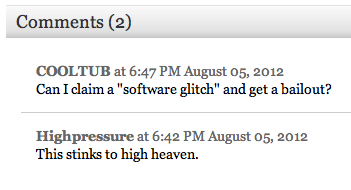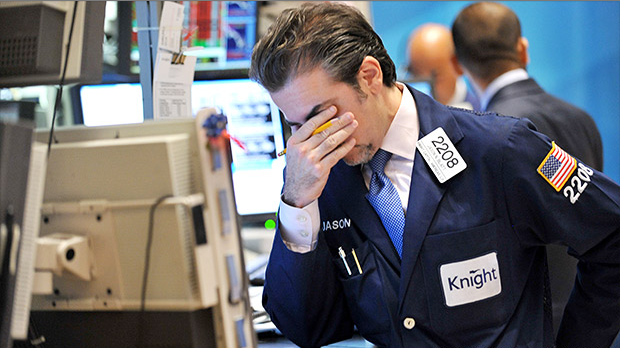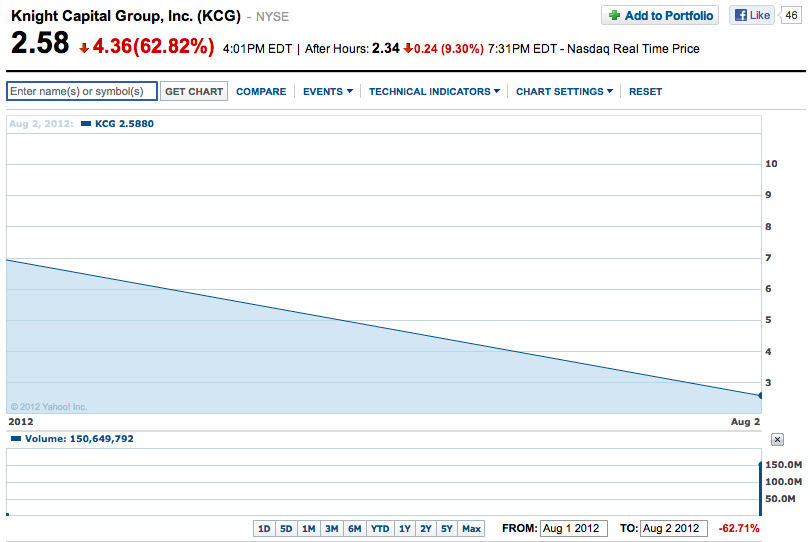Last week we wrote about the meteor that landed on Knight Capital. If you can’t be bothered to read that post, the New York Stock Exchange’s biggest market maker endured a computer glitch that resulted in the company losing $440 million. Knight fell victim to a singular event (at least one wag actually used the term “black swan”), shrank to a third of its size overnight, and looked like it might not survive the week.
Here we have a company that
- Provides a valuable service.
- Is the market leader, more or less.
- Has a solid reputation.
- Suffered a temporary, non-lethal, inadvertent misfortune, as opposed to doing something villainous.
Knight’s stock (KCG) opened trading at $10.33 last Wednesday. The software flaw showed up immediately and was contained within 45 minutes. KCG closed the day at $6.93, opened the next morning at $3.48, reached a nadir of $2.43 late in the afternoon, and closed at $2.59.
This is what’s called a buying opportunity. KCG opened the following Friday at $3.11, closed at $4.05, and on Sunday received the $400 million cash infusion it needed to stay alive.
Who loaned them the money?
- TD Ameritrade, one of Knight’s biggest clients.
- Stifel Nicolas, a brokerage that sounds faintly Swiss but is actually based out of St. Louis.
- Blackstone Group, a private equity firm.
- General Atlantic, another private equity firm and owner of Getco (Global Electronic Trading Company), another market maker, one of 6 firms designated as such by the NYSE.
- 2 unnamed investors, probably selfish capitalists like that job-killing tax cheat Mitt Romney.
The money comes with strings attached, of course. The lenders received something called “convertible securities”, which are bonds that will turn into stock at a certain undisclosed price. The 4 disclosed lifeguards and Mystery Firms E and F don’t make it a habit of lending money without it offering the likelihood of decent return, especially when forced to make a decision with only 2 days’ notice.
While we don’t know many more details of the deal, including the strike price of those convertible securities, the consensus belief is that it’s less than the $4.05 Knight stock ended the week at.
Here’s the type of reasoned response that makes the consistently under-water easy to distinguish from the enterprising few. From the LA Times story on Knight:
Not that internet comments are ever going to be a source of any usable knowledge, but it’s probably fair to say that COOLTUB and Highpressure’s opinions are not out of the mainstream.
The easy, effortless, simplistic, reactionary and false way to look at the Knight capital infusion is as fat cats covering for each other. The first commenter seems to think either that federal taxpayers are cutting a check to Knight, or that there isn’t a difference between that and private capital.
We don’t want to assume anything, but we’re guessing that when Magic Johnson and a handful of rich white financiers recently did the exact same thing for the Los Angeles Dodgers, COOLTUB and Highpressure were ecstatic about it.
Don’t be an idiot. How can you compare the two? The Dodgers as a team are a community icon, not just a bunch of rich guys shuffling paper.
No, they’re a bunch of rich guys swinging bats and fielding balls. The Dodgers pay an average of $3,171,452 to their top 25 employees. We don’t have a similar figure for Knight, but it’s almost certainly less.
We’re getting off track here, and we swear we didn’t start this post intending for it to turn into a sports analogy. But it’s important to remember that when a legitimate business that provides a benefit to society (in the form of liquidity) gets smacked in the mouth, it’s a chance for a sharp investor to make some money. If Knight had been charged with fraud, that’d be something vastly different, and inapplicable here.
Maybe you’re tentative, and still don’t think KCG is a good buy. Or you’re not familiar enough with the company’s stock in trade to take a position. Fine. Look around you and you’ll see opportunities daily. Seriously, daily. The local business that needs cash to expand and is looking for a silent partner. The overextended homeowner, or car owner, desperate to sell. The stock of the company that recently underwent an even less traumatic event than Knight did. (Read WSJ.com and Yahoo! Finance, just for a few minutes a day at the start. Think of it as unmarked course work for your future career in self-determination.)
You can get past the initial reluctance, the thought of “The markets? Not for me. Nothing more demanding than a conservative mutual fund in my company-directed 401(k), thanks very much.” Really, you can.
Or you can just assume that your job and its annual cost-of-living raises will help you build wealth as convincingly as seizing opportunities will. Whatever.







